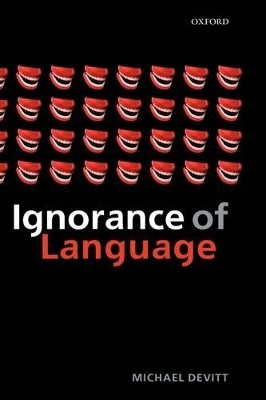
Ignorance of Language
Seiten
2006
Oxford University Press (Verlag)
978-0-19-925096-7 (ISBN)
Oxford University Press (Verlag)
978-0-19-925096-7 (ISBN)
What is linguistics about? What role should linguistic intuitions play in constructing grammars? What is innate about language? Arguing that linguistics is about linguistic reality and is not part of psychology, this book offers answers to these questions. It is intended for those working on language and the mind.
The Chomskian revolution in linguistics gave rise to a new orthodoxy about mind and language. Michael Devitt throws down a provocative challenge to that orthodoxy. What is linguistics about? What role should linguistic intuitions play in constructing grammars? What is innate about language? Is there a 'language faculty'? These questions are crucial to our developing understanding of ourselves; Michael Devitt offers refreshingly original answers. He argues that linguistics is about linguistic reality and is not part of psychology; that linguistic rules are not represented in the mind; that speakers are largely ignorant of their language; that speakers' intuitions do not reflect information supplied by the language faculty and are not the main evidence for grammars; that the rules of 'Universal Grammar' are largely, if not entirely, innate structure rules of thought; indeed, that there is little or nothing to the language faculty. Devitt's controversial theses will prove highly stimulating to anyone working on language and the mind.
The Chomskian revolution in linguistics gave rise to a new orthodoxy about mind and language. Michael Devitt throws down a provocative challenge to that orthodoxy. What is linguistics about? What role should linguistic intuitions play in constructing grammars? What is innate about language? Is there a 'language faculty'? These questions are crucial to our developing understanding of ourselves; Michael Devitt offers refreshingly original answers. He argues that linguistics is about linguistic reality and is not part of psychology; that linguistic rules are not represented in the mind; that speakers are largely ignorant of their language; that speakers' intuitions do not reflect information supplied by the language faculty and are not the main evidence for grammars; that the rules of 'Universal Grammar' are largely, if not entirely, innate structure rules of thought; indeed, that there is little or nothing to the language faculty. Devitt's controversial theses will prove highly stimulating to anyone working on language and the mind.
I. LINGUISTICS IS NOT PSYCHOLOGY ; II. POSITIONS ON PSYCHOLOGICAL REALITY ; III. 'PHILOSOPHICAL' ARGUMENTS FOR THE REPRESENTATIONAL THESIS ; IV. THE RELATION OF LANGUAGE TO THOUGHT ; V. LANGUAGE USE AND ACQUISITION
| Erscheint lt. Verlag | 1.7.2006 |
|---|---|
| Verlagsort | Oxford |
| Sprache | englisch |
| Maße | 163 x 242 mm |
| Gewicht | 631 g |
| Themenwelt | Geisteswissenschaften ► Philosophie ► Sprachphilosophie |
| Geisteswissenschaften ► Psychologie ► Allgemeine Psychologie | |
| Geisteswissenschaften ► Psychologie ► Verhaltenstherapie | |
| Geisteswissenschaften ► Sprach- / Literaturwissenschaft ► Sprachwissenschaft | |
| ISBN-10 | 0-19-925096-0 / 0199250960 |
| ISBN-13 | 978-0-19-925096-7 / 9780199250967 |
| Zustand | Neuware |
| Haben Sie eine Frage zum Produkt? |
Mehr entdecken
aus dem Bereich
aus dem Bereich
Aspekte einer Ontologie des Logos
Buch | Hardcover (2024)
Springer Fachmedien (Verlag)
CHF 167,95
Wie die Menschheit zu ihrer größten Erfindung kam
Buch | Softcover (2022)
C.H.Beck (Verlag)
CHF 25,20
Macht und Legitimität politischer Sprache im Prozess der europäischen …
Buch | Softcover (2023)
Nomos (Verlag)
CHF 103,60


